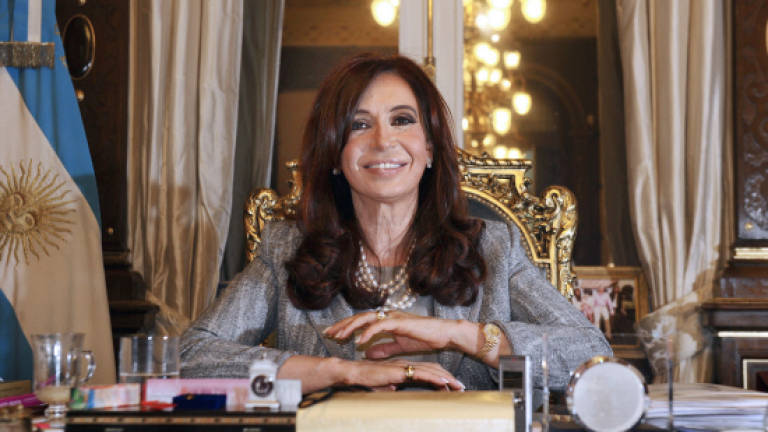Cristina and co: Latin first ladies and presidents

LIKE "Evita" before her, Cristina Kirchner stepped from her husband's shadow to make a mark on Argentine politics -- one of several powerful women in the macho Latin American political world.
"I am not Evita, nor Hillary", Kirchner, who is widely known just as "Cristina," once said.
She spoke when she was a senator and first lady of Argentina ahead of the 2007 presidential election that brought her to office as the successor to her husband, Nestor.
In one sense she was right. Kirchner, 63, has been arguably more divisive than either the erstwhile Argentina leftist heroine or even Bill Clinton's wife, now running for US president.
"I have some things in common with Hillary. We have both been senators, lawyers and wives of presidents, but not much more," Kirchner said.
"I don't want to be compared to Hillary or Evita or anyone. The best thing you can be is yourself."
Kirchner says she has contended with a sexist political culture and media who often belittled her political decisions as bouts of womanly "hysteria."
After being elected to succeed her husband, Kirchner pushed on with his left-wing social policies.
"He always told me that people would demand much more of me" than of him when he was elected in 2003 in the wake of a financial crisis, she said in a televised interview last week.
"We were in such a bad state in 2003 that they never demanded things of him that they later demanded of my government," she said.
Like other Latin American leftist leaders, for her supporters Kirchner was a heroine of the poor. But to her rivals, she was an irresponsible populist.
"In my case there was another aspect, the feminine aspect," she said.
"That weighed heavily in Argentina, where in some areas there is still misogyny about women in power."
Dilma
"Cristina says that after so many decades as a deputy and a senator, she got used to fighting to be listened to in places where it was hard to be heard," said Sandra Russo, author of an official biography of Kirchner, published in 2011.
"She has a very high mental threshold."
Kirchner compared her treatment in the media with another recent Latin American female leftist head of state, Dilma Rousseff of Brazil.
On the front page of a magazine, Kirchner said, "they portrayed me as hysterical and crazy. They did the same with Dilma. We are both women."
Like Kirchner, Rousseff has succumbed to scandal. She has been suspended from office to face an impeachment trial over alleged financial irregularities in what she has called a "coup" by her rivals.
In Argentina, meanwhile, the courts are also going after Kirchner over alleged corruption, in what she has branded a politically motivated campaign.
Her conservative successor, Mauricio Macri, is busy unwinding her social welfare policies and protectionist trade measures.
Rosario
Latin America has seen 10 women presidents in the past four decades.
Among them, socialist Michelle Bachelet is serving her second term as president of Chile.
In Peru, Keiko Fujimori narrowly lost a presidential election in June. She served as first lady during the leadership of her now-jailed father Alberto Fujimori.
In Nicaragua, President Daniel Ortega, 70, this week put his wife, Rosario Murillo, down as his vice-presidential running mate as he runs for re-election in a Nov 6 vote.
Murillo, 65, is currently a government minister and the main spokesperson for Ortega's leftist administration.
Many see her as the real power in the country over the past decade.
She is a mother of 10 and a well-known poet in her country.
Ortega is widely expected to win a third consecutive term from 2017 to 2022, given the fragmented opposition. — AFP